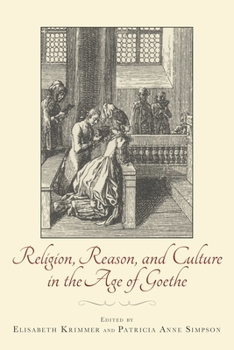Religion, Reason, and Culture in the Age of Goethe
(Part of the Studies in German Literature Linguistics and Culture Series)
The eighteenth century is usually considered to be a time of increasing secularization in which the primacy of theology was replaced by the authority of reason, yet this lofty intellectual endeavor played itself out in a social and political reality that was heavily impacted by religious customs and institutions. This duality is visible in the literature and culture of late eighteenth- and early nineteenth-century Germany. On the one hand, authors...
Format:Hardcover
Language:English
ISBN:1571135618
ISBN13:9781571135612
Release Date:December 2013
Publisher:Camden House (NY)
Length:288 Pages
Weight:1.31 lbs.
Dimensions:0.8" x 6.0" x 9.0"
Customer Reviews
0 rating





